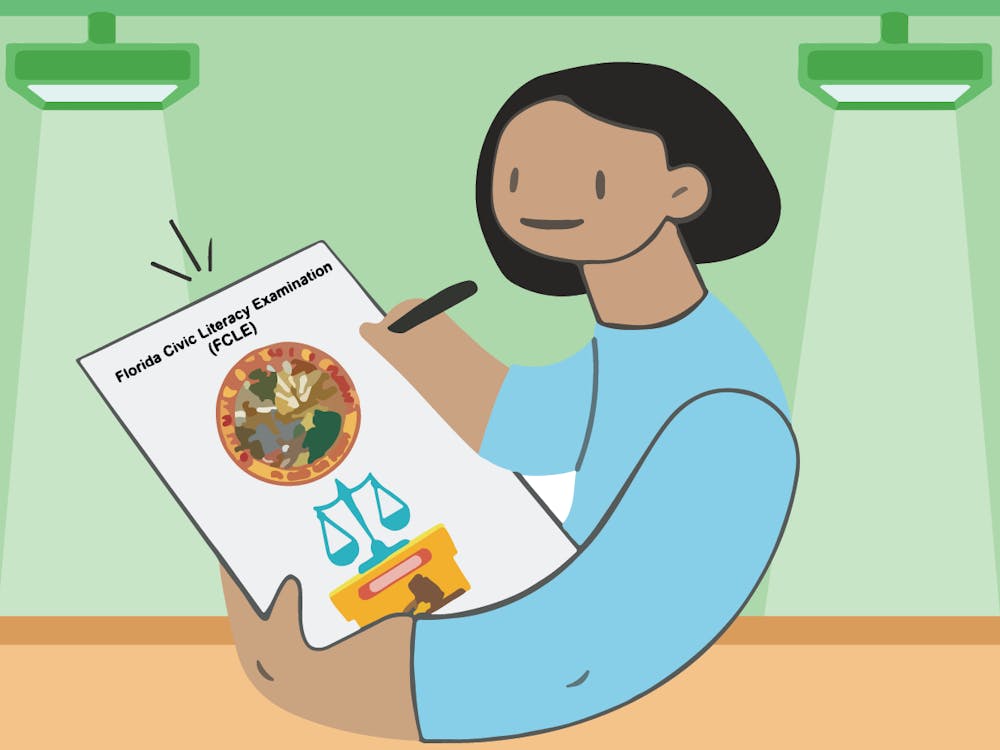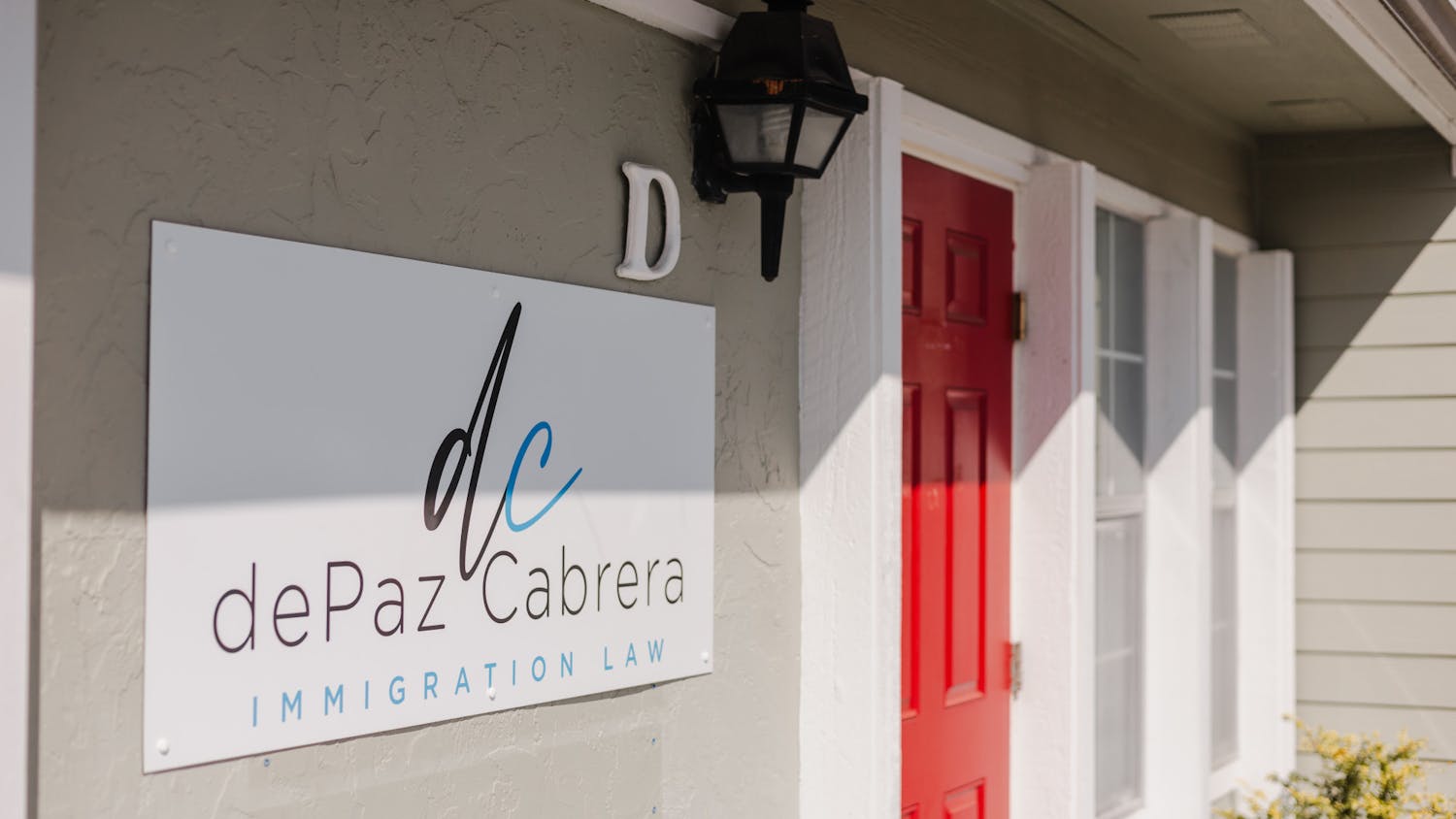A regulation amendment traveling through the Florida Board of Governors will increase students’ options to complete the civic literacy requirement added in 2017 to state education statutes.
Contrary to original confusion, the regulation will not remove the option for immigrant students to use naturalization test scores to meet the requirement. That option never existed.
The civic literacy requirement in its current form requires students entering universities during or after the 2021-2022 school year to complete both an exam and a course to prove knowledge of American democracy, the United States Constitution and landmark Supreme Court cases.
Course options currently include American Federal Government (POS2041) and U.S. History Since 1877 (AMH2020). Assessment options include two AP exams, one College Board exam and a test based on the U.S. Citizenship and Immigration Services Naturalization Test but with supplemental questions.
The amended Regulation 8.006 would add U.S. History Since 1877 (AMH2010) to classes, remove the Citizenship Test-based exam and replace the latter with the Florida Civic Literacy Exam.
The test change, explained
The amendment’s text states it will “replace the U.S. Citizenship and Immigration Services Naturalization Test” as an option for meeting civic literacy assessment.
Immigrant rights groups said this creates barriers to first-generation college students who have already taken the citizenship test to become naturalized and now have an extra step.
But despite the potentially confusing amendment language, passing the U.S.
Citizenship test for naturalization purposes has never been an option for Florida students to demonstrate civic literacy. The reason dates to the statute’s creation.
Florida lawmakers passed a 2017 bill requiring students to demonstrate civic knowledge at the request of Florida history faculty like Frank Baglione, a Tallahassee Community College history and legal professor.
“You don’t have to watch TV commentators stopping people on the street and asking why we celebrate the Fourth of July to realize that a lot of Americans don’t understand some of the basic basics of our system,” Baglione said.
The bill requires students, beginning in 2018-2019, to demonstrate civic literacy through a course or already-existing test. At the time, the only existing tests were from AP and College Board. When the Florida College System tried to add the U.S. Citizenship Test, Baglione and other faculty objected.
The “fairly basic” citizenship test doesn’t adequately measure government knowledge, Baglione said.
To pass the U.S. Citizenship Test, naturalization candidates must orally answer six out of 10 randomly selected questions from a bank of 100. Just 36% of Americans could pass, according to an Institute for Citizens & Scholars report.
The Florida College System pulled the U.S. Citizenship Test. But in March 2020, it tried to add it again.
This time, colleges proposed an updated version of the original U.S. Citizenship Test, which had supplemental questions devised in partnership with the University of Central Florida Lou Frey Institute.
The new exam’s 100 written questions included topics missing from the original U.S. Citizenship Test — in particular, U.S. Supreme Court cases, said Steve Masyada, the institute’s director.
“The naturalization test … it’s really rote learning, rather than asking students to really think,” he said. “The new exam goes a little deeper.”
Baglione and others weren’t impressed. In June 2020, a group of history faculty and parents levied a petition against the U.S. Citizenship Test with supplemental questions.
The Florida College System, which coordinates Florida’s 28 public community and state colleges, removed the test again. But the State University System of Florida, which oversees the state’s 12 public universities, didn’t receive equivalent pushback and kept the modified citizenship test.
The colleges and UCF Lou Frey Institute, meanwhile, created a brand-new test to satisfy college faculty and Board members — the Florida Civic Literacy Exam.
Instead of taking the Citizenship Test and adding a few multiple choice answers, the subject matter experts who created the FCLE made it statute-aligned, understandable and unbiased, said Carrie Henderson, an adviser at TSG Advisors who served as Florida College System executive vice chancellor from 2018 to 2023.
“It evolved from this original idea, which is, ‘Let's just use the citizenship test,’ into a much more rigorous exam,” she said. “And it's really hard to pass. I was a history major, and I struggled.”
The Florida Civic Literacy Exam became the first test colleges successfully added to civic literacy in November 2021. The ruling also specified students will have to take both an assessment and a course to clear the requirement, beginning 2021-2022.
State universities are “catching up” to state colleges with the new regulation by replacing the modified citizenship test, Henderson said.
Immigrant students unaffected
Henderson doesn’t think objections to students using the U.S. Citizenship Test to demonstrate civic knowledge were anti-immigrant, she said.
“From my experience, that wasn’t the case,” she said. “I think the chief concerns, one was just content that didn’t cover the competencies. The second concern was that it was an oral test, and that’s different than a written test.”
Many international students couldn’t have used the citizenship test even if sanctioned. The majority have student visas, which don’t afford a path to long term residency, said Juan Caballero, UF Levin College of Law Immigration Law Clinic director.
Students in the U.S. for college may never take the naturalization test, which requires applicants to have been living domestically for five years with a green card.
“You’re talking about several steps removed for these individuals who might or might not be planning to stay here afterwards,” Caballero said.
Others may have immigrated as children and had parents who took the exam on their behalf, he said.
The only students who could’ve used the U.S. Citizenship Test for civic literacy are those like Rousemary Estrada, a 20-year-old UF information systems junior from Mexico who applied for citizenship after immigrating to finish high school.
Estrada became a citizen last year, and thanks to high school history classes, she passed the U.S. Citizenship exam with nine out of 10 correct answers, she said.
“There’s PDFs and practice questions of what specific tests they have, and it’s a pamphlet of almost 10 pages,” she said. “I just needed to study a few that I had forgotten in high school.”
Estrada lived in the U.S. from infanthood until age 8. But even so, civics tests are harder for someone with her background, and civics courses can make her anxious, she said.
“Professors here expect their students to be naturalized in English, when even American-born people have struggled with their own language,” she said. “When someone expects that kind of level of you and you can’t fully perform that because you have prior knowledge … it kind of gives that anxiety and frustration.”
Existing course to meet new requisite
In addition to the Florida Civic Literacy Exam, the regulation amendment will add U.S. History to 1877 to civic literacy courses.
“I think it makes perfect sense, a lot of sense, to put it in as a civics requirement,” said Nina Caputo, UF history professor and associate chair of the history department. “It’s all built into [AMH] 2010, because that’s from the colonies through the Civil War.”
The history department offers about 35 seats in History to 1877 classes per semester, Caputo said. She’ll add a class of 62 seats to Fall 2024 in anticipation of more students signing up to clear civic literacy.
When Florida added U.S. History Since 1877 to civic literacy requirement statutes in 2018, the explosion in demand for the class was “shocking,” and the history department had to add hundreds of seats, said Joseph Angelillo, a UF history Ph.D. student and History to 1877 instructor.
“It has been weird for the graduates,” he said. “Because now we have lots of grad students who don’t study U.S. history that have to T.A. [for] U.S. history now, just because we’ve been a little short on [U.S. history] grad students.”
His associate department chair Nina Caputo doesn’t expect the same wave to sign up for History to 1877 as did for History Since 1877 when it underwent the same change, she said. Students tend to prefer the latter, and many of them come in with the AP credits required to skip the former, she said.
Ethan Wang, a 20-year-old UF economics junior, is now taking History Since 1877 to clear his civic literacy course requirement. Wang was worried because he’s “not super good” at history and has less background knowledge about U.S. history as a transfer student from China.
But Wang’s instructor, UF Ph.D. student Kevin Bird, has made the class fun rather than stressful, he said. Wang especially enjoyed learning about the Vietnam War, he added.
“It’s pretty fun,” he said. “And the exams are pretty general. It’s not super targeted, specific questions, so as long as you know the general idea, and I think the way they’re setting it is pretty good.”
The amendment adding History Since 1877 to course options and replacing the U.S. Citizenship Test with supplemental questions with the Florida Civic Literacy Exam received unanimous approval of Public Notice of Intent at the Board of Governors meeting March 27.
After its 14-day public comment period received no objections, the regulation will go before the Board of Governors for final approval at its next meeting, which is set for May 8 via an online conference.
Board of Governors Director of Communications Cassandra Edwards said the Board did not have a staff member available to discuss the regulation. She emphasized the Florida Civic Literacy Exam is a “completely different assessment” from the U.S. Citizenship Test in an email to The Alligator April 9.
Contact Zoey Thomas at zthomas@alligator.org. Follow her on X @zoeythomas39.
Zoey Thomas is a media production junior and The Alligator's Spring 2025 data editor. She previously reported for the metro, university and enterprise desks. In her free time, you can find her reading, crocheting or arguing for the superiority of sweet potatoes over regular potatoes.






